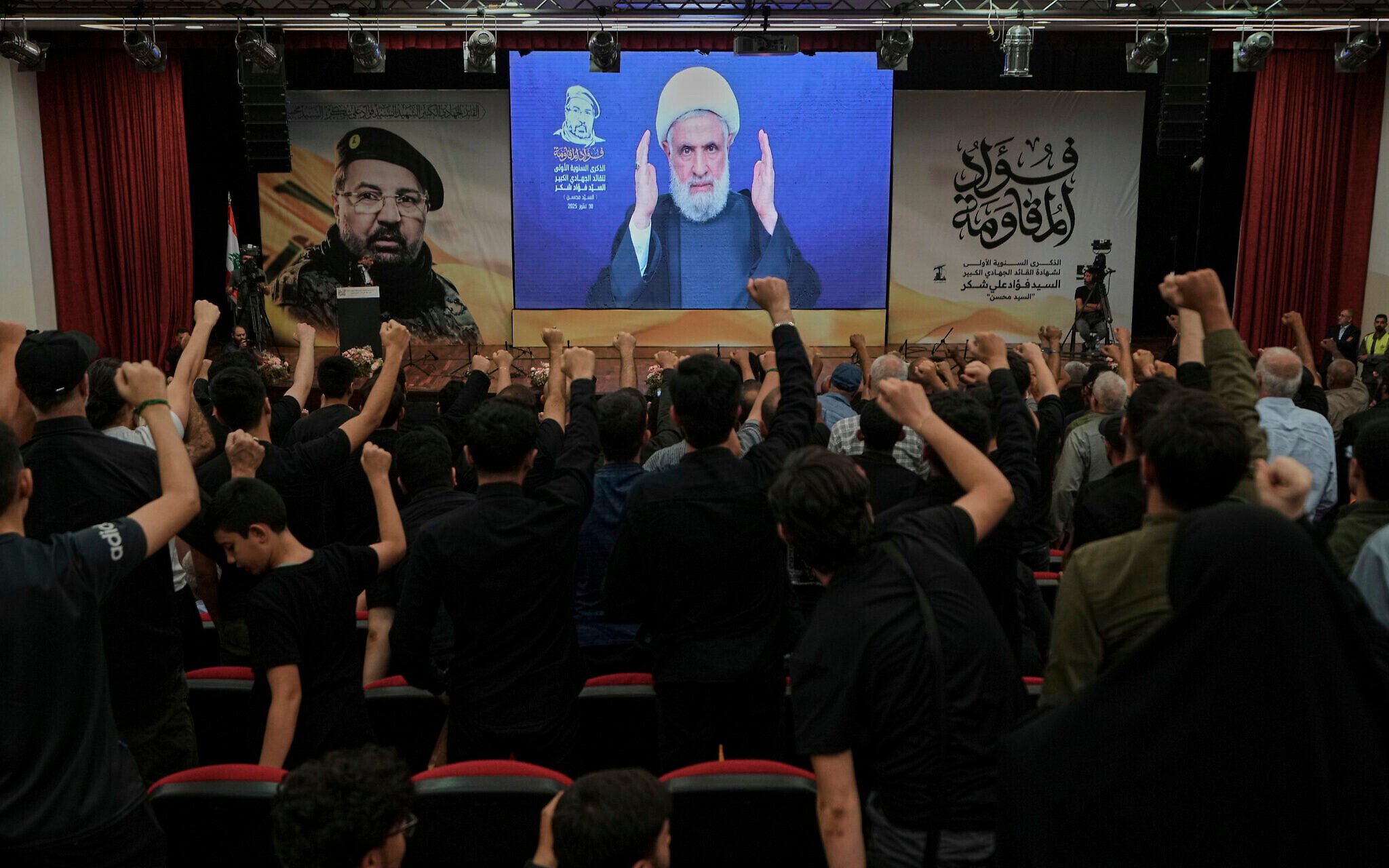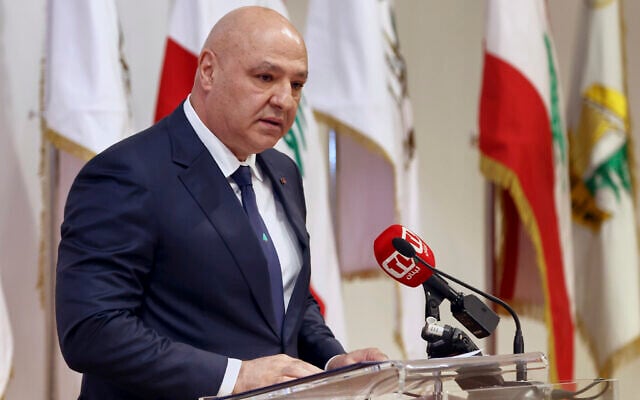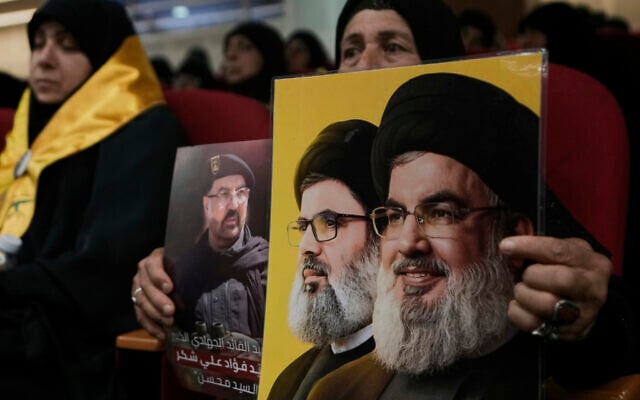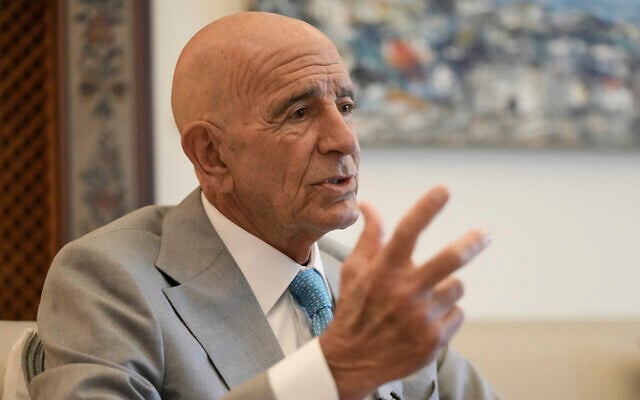



BEIRUT — Hezbollah’s chief rejected calls to disarm on Tuesday and threatened a new war with Israel if it opened a “large-scale aggression” against Lebanon.
Naim Qassem’s speech came while Lebanon’s cabinet held a meeting to discuss the thorny issue of disarming the terror group, a step the United States has demanded. But Qassem rejected US “dictates” over its future.
“Are we being asked to engage in dialogue, or to surrender our weapons without dialogue?” Qassem said. “We cannot accept Lebanon committing to gradually giving up its strength while all the strength cards remain in the hands of the Israeli enemy.”
The demands that Hezbollah disarm follow a November 2024 ceasefire that ended more than a year of conflict with Israel, which began when the terror group started cross-border attacks on Israel on October 8, 2023.
Hezbollah, which is backed by Iran, emerged badly weakened from that fight, which included two months of all-out war. The group saw its arsenal pummelled and a slew of senior commanders killed, among them its longtime leader Hassan Nasrallah.
Hezbollah’s domestic influence has also waned since then. Lebanese President Joseph Aoun, who took office this year, has pushed for a state monopoly on arms, which Hezbollah has refused for decades. Aoun has also called on Israel to withdraw from the five points in southern Lebanon it still occupies, from which it continues to carry out airstrikes when it sees infractions of the ceasefire.

Washington and Beirut have been in talks since June on a US roadmap to fully disarm Hezbollah in exchange for a halt to the Israeli strikes, the withdrawal of Israeli troops still in Lebanon and funds to rebuild areas destroyed by Israeli bombardment during the war.
But with little progress on disarmament, Washington’s patience began wearing thin and it pressured Lebanon’s ministers to swiftly make a public pledge so that talks could continue.
Aoun last week said Lebanon was committed to removing “weapons from all armed groups, including Hezbollah,” and seeing them surrender to Lebanon’s army.
Lebanon is at “a crucial stage” and must choose “between collapse and stability,” Aoun had said, linking international support for the crisis-hit country to disarming the group.
Agenda items for Tuesday’s cabinet meeting included discussions “on extending the state’s sovereignty across all its territory exclusively through its own forces” and talks on the November ceasefire.

Qassem, who gave his televised address while the cabinet meeting was underway, said Hezbollah would not disarm while Israeli attacks continue.
“Any timetable presented for implementation under… Israeli aggression cannot be agreed to,” he said. He added, referring to the November ceasefire, “We do not agree to any new deal other than the existing deal between the Lebanese state and the Israeli entity.”
Before discussing the fate of its weapons, Hezbollah has demanded that reconstruction of areas destroyed during the war begin, and that Israel stop its attacks, withdraw from the areas it occupies in Lebanon and release Lebanese prisoners.
Qassem said the war had killed 5,000 Hezbollah fighters and wounded 13,000, the first official toll the group has given. But he said the organization remained in good order, with fighters ready to make “the harshest sacrifices” if needed.
Qassem warned Israel against launching any new “large-scale aggression” because “if it does, Hezbollah will go on the defensive, “and this defense will lead to rockets falling inside the Israeli entity.”
Qassem criticised a recent proposal presented by US envoy Tom Barrack on disarming the group.
“Whoever looks at the deal Barrack brought doesn’t find an agreement but dictates,” he said, arguing that “it removes the strength and capabilities of Hezbollah and Lebanon entirely.”

Minutes after he spoke, dozens of men on motorcycles carrying Hezbollah’s yellow flags emerged from its strongholds in Beirut’s southern suburbs for the second day in a row.
Last month, Barrack urged Lebanon to “act now” to impose a state weapons monopoly.
A Lebanese official with knowledge of the talks told AFP that “Washington is pressuring Lebanon to make Hezbollah hand over its weapons according to a timetable, but without (the US) providing any guarantees.”
The group will not surrender its weapons “without something in return — the Americans know this well,” the official added, speaking on condition of anonymity.
